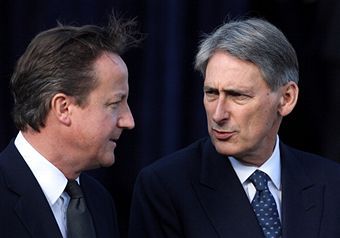 A day into his new job, Phillip Hammond would be excused for sitting back and wondering
what he has let himself in for. The job of defence secretary is every Tory’s dream, and the businessman-turned-politician is well-placed to excel in it. But the armed forces and the Ministry of
Defence face a number of challenges that would test even history’s greatest defence and war secretaries.
A day into his new job, Phillip Hammond would be excused for sitting back and wondering
what he has let himself in for. The job of defence secretary is every Tory’s dream, and the businessman-turned-politician is well-placed to excel in it. But the armed forces and the Ministry of
Defence face a number of challenges that would test even history’s greatest defence and war secretaries.
Six challenges stand out:
1) To reshape the military’s structures, systems and capabilities. This should be done according to the decisions taken in the SDSR to place defence on a surer financial footing. Much of what needs to be done has been set in train, but it will be crucial that the new defence secretary ensures decisions are not undermined in the change-over, and that the process continues post-haste.
2) To conclude successfully the military operations in Libya and Afghanistan. The US is looking to draw-down in Helmand more quickly than the UK. The defence secretary will have to
make decisions about the rate of withdrawal, given the changing environment. In Libya, the UK will probably be required to perform an enduring support role developing Libyan security forces. The UK
has bought credit with David Cameron’s leadership, now is the time to capitalise on building relationships through training and equipping the new Libyan Forces. The extent of UK military
involvement will be a key early decision.
3) To ensure that morale remains high. This will be in spite of a difficult financial climate, downsizing and the onset of operational fatigue. This is not only a question of
having a force fit for the fight, but over the next five years, as reforms kick in, there is a real risk that the armed forces will haemorrhage good people. Many senior officers already appear
disenchanted, but it’s not too late to keep the best.
4) To re-establish the credibility of the MoD. The regard in which the forces are held has rarely been higher, but decisions taken over the last decade have undermined the leadership. The MoD has traditionally attracted some of the best civil servants; but, recently, military officers have gained too greater a voice in the policy process. The MoD must attract good officials, support them and clear the way for the creativity the military show on operations to have effect in Whitehall. This is a job for Hammond and his senior officials, who must see that the ministry continues to work effectively with other departments.
5) To get a grip on defence procurement. The problems have been laid bare numerous times, and Liam Fox actually seemed to have initiated the remedy, bringing in Bernard Gray to oversee an overhaul. Continuing this work is of the utmost importance.
6) The new defence secretary will need to buck up NATO. The alliance risks a post-Afghan loss of faith and many European allies have cut their defence expenditure at an alarming rate. Also, as the Libyan campaign demonstrated, the US may choose to stay out of fights that it deems a second order priority. So, Hammond and his department will have to encourage competent NATO allies — like France, Netherlands, Denmark, and Norway — to maintain investment in military capability unless Britain wants to risk fighting alone in future.






Comments